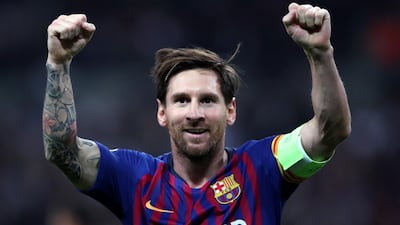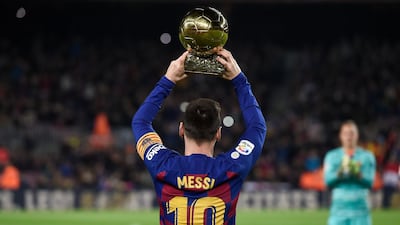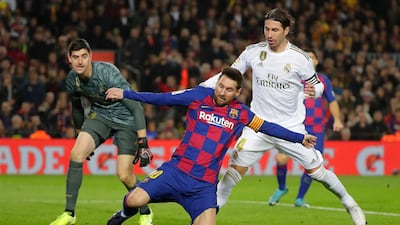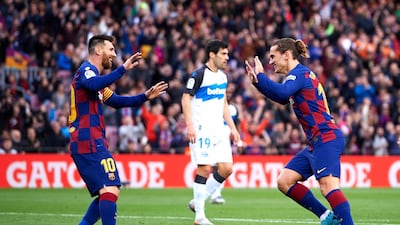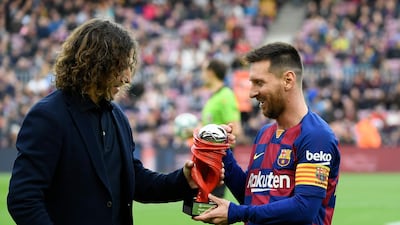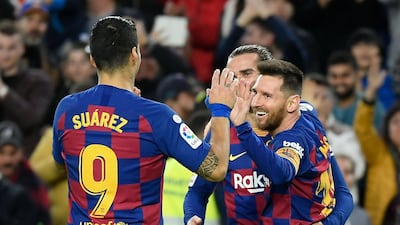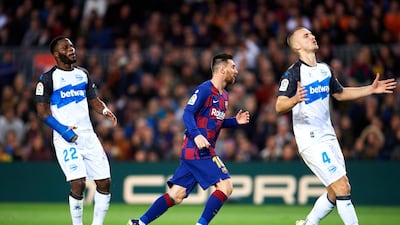Spanish football closes 2019 feeling a little empty-handed. It has been a while since none of the major international prizes were housed in Spain at New Year.
At the beginning of the 2010s the national team won its first World Cup and successfully defended its European Championship. Real Madrid won four Champions Leagues, Barcelona two, and only in one year - 2013 - did a Spanish club not have ownership of either that trophy or the Europa League. Then came 2019, and the painful clean sweep of Premier League success across those competitions.
Which is partly why the governors of Spanish football have turned so imperial in trying to sell La Liga as the game’s true modern standard-setter. The urge to relocate one match per season to the United States became an - as yet unfulfilled - obsession. Next month, an expanded Spanish Super Cup, featuring Barcelona, Atletico Madrid, Real Madrid and Valencia, will land in Saudi Arabia for a three-game spectacle, designed for the world to admire.
The best footballer on the planet will be there: Lionel Messi - La Liga’s greatest asset. It is now nearly ten years since Pep Guardiola, declared he had “run out of superlatives” for Messi. The current Barca boss, Ernesto Valverde, is still tongue-tied. He last week described Messi, 32, as having achieved “a level of perfection all the time the rest of us might just about manage in, say, one pass in a whole career. It’s hard to add to everything that has been said of him.”
Messi, La Liga’s top goalscorer so far, is why Barca end 2019 top of the table, just ahead of Real Madrid. But they are not galloping towards a third successive title. The 2019/20 Liga will not, it appears, be one of those where the champion amasses more than 90 points. Though Atletico Madrid, the dynamic risers of the last decade, have stuttered lately, there is a healthy spread of competitive edge. Sevilla, Real Sociedad and hardy Getafe make up a feisty top six.
Getafe, economically constrained, spent most of the first half of the year in the top four, missing a historic spot in the Champions League only because of the astonishing spring revival of Valencia, whose turbulent year finishes with a place in the last 16 of Europe’s principal club competition. Getafe battle on, and will be in the Europa League in February.
Both hope to restore Spanish football’s reputation in Europe, one damaged by Barcelona’s 4-0 capitulation in the most dramatic of reverses against Liverpool: They went to Anfield 3-0 up in their Champions League semi-final. There was Real Madrid’s brutal deposing as European Cup holders, outplayed by Ajax. Their response? To go back to the future, Zinedine Zidane returning as head coach, after nine months away.
His previous Midas touch - three campaigns, three European Cups - may be impossible to recreate but where there is Zidane there is a soothing, ambient confidence. A fit Eden Hazard, the big signing of the year, would boost it; a pause in the distracting saga of how Gareth Bale’s eventual exit can be managed would also benefit player and coach.
Bale was one heavily signposted transfer that did not happen in 2019. Neymar’s return to Barcelona was another. Antoine Griezmann was the mover who said ‘no’ and then ‘yes’, irritating both his selling club, Atletico, and the buyers, Barcelona. Griezmann’s Barca performances have made fewer ripples than his €120m switch did but, like Hazard, he might still shape this open-looking league season.
Players like Joaquin, 38, remind both of them that flair, love-of-the-game and spontaneity are Spanish football’s richest ingredients. In 2019, the veteran winger scored his first career hat-trick, for his beloved Real Betis, not long after Athletic Bilbao’s homegrown evergreen, Aritz Aduriz, had opened the season with a stunning bicycle-kick goal to belie his 38 years.
But prize for most heart-warming, age-defying feat goes to Santi Cazorla. Three years ago, the state of Cazorla’s injured, gangrenous ankle was so bad he was advised he might never walk normally. In 2019, brilliant for Villarreal, the elf of Asturias was recalled to the national team. A month shy of his 35th birthday, he scored his first goal for Spain in more than four years.
From the generation beneath, there was Joao Felix, who, aged 19, joined Atletico for a club-record €126m, the largest fee ever paid for any teenager bar Kylian Mbappe. There was 16-year-old Ansu Fati, Barcelona’s youngest goalscorer. They share one huge, common challenge. Felix is Portuguese, so the ‘New Cristiano Ronaldo’ label is his heavy badge. Ansu, mentored by Messi, is already designated Barca’s bright light for that dreaded time when, finally, new superlatives for Messi are no longer sought.
